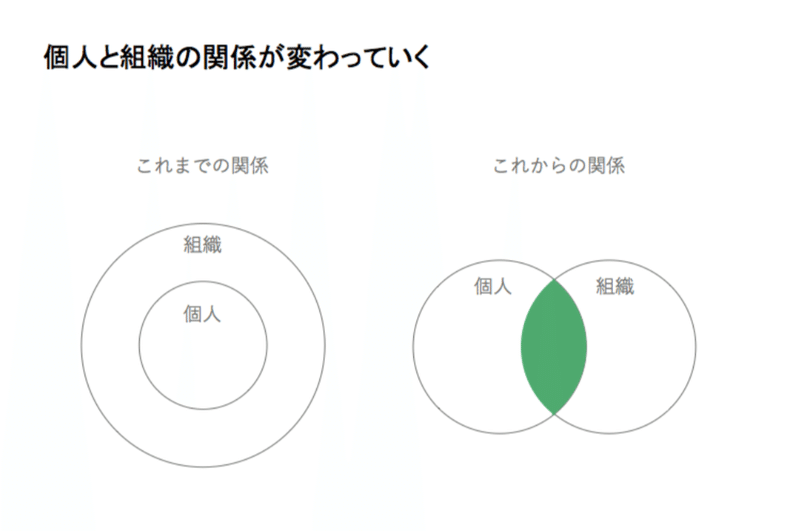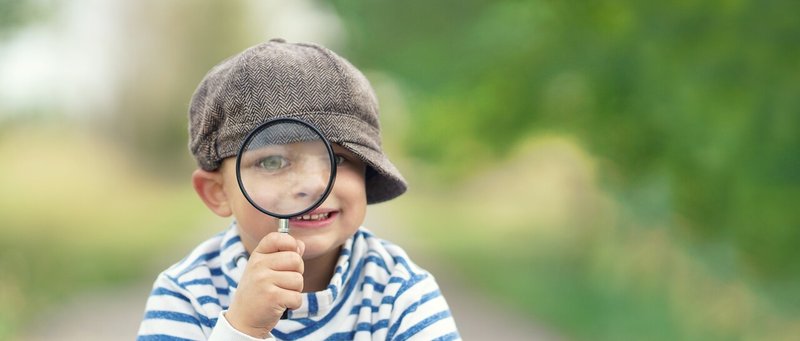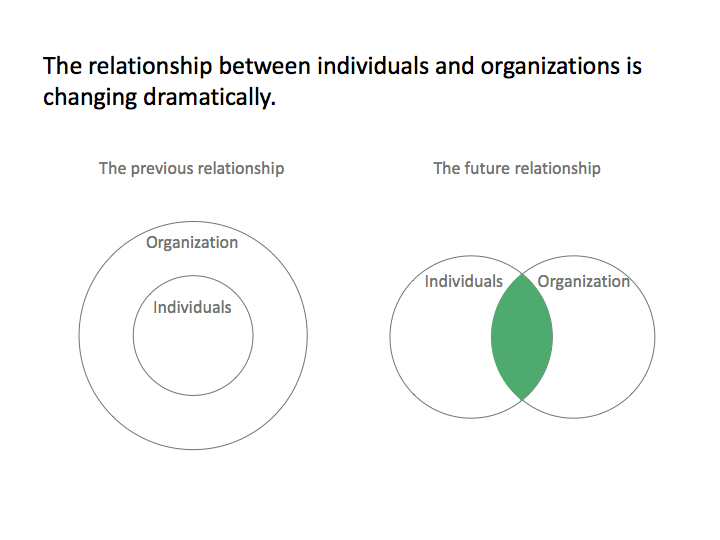
なぜいま、自己信頼が重要か?
みなさんは、「あなたについて説明してください」と言われたら、どのように答えますか?
まず、年齢や出身地や家族構成など、自分の属性について答える人が多いかもしれません。また、働いている会社や肩書きといった、所属するコミュニティについて答える人もいるでしょう。これまでやってきたことを紹介する人もいれば、性格について伝える人もいるかもしれません。
これらはどれも、間違いではありません。
一方で、様々な特徴を言葉で表したところで、自分を説明したことになるでしょうか? それらは、自分に関する要素ではあるものの、自分の全体や、自分の根幹を表現しているような感じはしないのではないでしょうか。様々な特徴を分解して説明しても自分自身にならないとしたら、どうすれば「ほんとうの自分」を捉えられるのでしょうか。
個人と組織の関係が変わっていく
「ほんとうの自分」をテーマとして取り上げた背景には、個人と組織の関係が大きく変わりつつあるという時代の流れがあります。
昭和の時代から平成の時代までは、「個人は組織に帰属する」という考えが主流でした。ベン図で表せば、個人は、組織の枠にすっぽり入ってしまうような関係です。
しかし、これからの時代は、組織があってその概念の中に個人が完全に内包されるのではなく、個人が複数の組織やプロジェクト、ジョブを組み合わせていく働き方が一般的になっていくのではないでしょうか。ベン図で表せば、個人の輪と組織の輪が対等に横に並んで、重なる部分もあれば、重ならない部分もあるという関係です。

肩書きの意味が薄れる時代に、何を信頼すればよいか?
このような環境では、肩書きそのものにはどんどん意味がなくなっていきます。「XX社の部長」であることは、会社を出てしまえばあまり意味がありません。「XX社の部長の経験を活かして何ができるか」が重要になっていきます。
さらに、複数の組織・業界に属するようになると、ある領域での評価が他の領域では通用しないことに気づきます。受験勉強でいい成績を収めても、社会に出れば成績そのものにはあまり意味がないのと同じことです。ある会社・業界でいい評価をもらっていたとしても、外の世界に出れば、その価値が全く認められないこともあるでしょう。
肩書きや評価は、特定のコミュニティの中での「他人からの評価」です。「他人からの評価」を拠り所にしていると、ある状況ではうまくいっていても、他の状況ではうまくいかないということが起きます。あるいは、他人からの評価が得られている状況では自分らしく振る舞えるけれども、それ以外の状況では自分らしく振る舞うことができないということも起きます。
他人からの評価に価値はないという話ではありません。他人からの評価があった方が、スムーズに協働ができるという場面もあるでしょう。ただし、他人からの評価のみに依存してしまうと、うまくいかないことも多くなるということです。
このような時代に拠り所になるのが「ほんとうの自分」です。これからは、他人からの評価ではなく、自分で自分を信頼できる人が強いのです。自分で自分を信頼することを自己信頼と呼びます。

もともと、自己信頼が弱い人間だった
私が、なぜ、自己信頼というテーマを大事にしているかと言えば、私自身、自己信頼が弱い人間だったという認識があるからです。いまでも、自己信頼が十分かと言われれば、そうではない面もあるというのが赤裸々な事実ですが、自己信頼について自分でメタ認知するようになってから、少しずつ自己信頼の厚みが増していることも実感しています。
自己信頼が弱いと気づいたきっかけは友人の一言でした。大学時代からテニスを一緒にしていた仲間で、弁護士事務所に勤める友人Kさんと、今でも年に1回から2回くらい一緒に食事をします。食事をするときに話をする内容はビジネスの話から、子供の教育の話まで多岐に渡りますが、人生経験豊かなKさんの話はいつも新しい観点や示唆を提供してくれます。
美味しいイタリアンレストランで夕食を一緒にしていたときの話題が、「自己信頼と自己信用」でした。この2つの言葉の意味や違いについては、今後の記事で解説したいと思いますが、Kさんからの、「文四郎って、自己信用あるけど、自己信頼薄めだよねー」という言葉ではっと気づきます。
(ちなみに、Kさんとは何でも言い合う仲ですので、お互いにそのようなことを言っても、嫌な思いをするとか、関係が崩れるというような話は一切ありませんし、私は今でもその友人の一言があったことに感謝しています。)
それまでの自分の感覚としては、(このように書くと傲慢な感じに聴こえてしまうかもしれませんが、、、)「自分はやればできる」という意味での自信や、自己有能感は持っており、それと自己信頼が厚いということを混同していました。Kさんは、それを見抜いており、上記の一言でそれを私に気づかせてくれたのです。

私の自分に対する感覚は、過去の経験に裏打ちされた自己信用であり、無条件に自分を信頼する自己信頼ではありませんでした。自己信用があるけれども、自己信頼がない状態であることについては、自分でも思い当たる節がありました。
「自分はやればできる」と思えるような場面であれば特に問題が起こることはありませんが、「自分はやればできる」と思うことができない場面に遭遇すると、自分が立ち戻る場所を失った感覚をもち、それがマイナスの言動となって現れるというパターンを繰り返していたのです。
以前の記事に書いた、自ら作り出した社長の孤独というのも、その1つの現れだったと思います。また、事業面の問題ではなく、組織面や人間関係の問題に対峙したときに、それまでの人生経験やコンサルティング時代の経験や、論理的・分析的アプローチが通用せずに、自分が立ち戻る場所を失う場面も多くありました。
その頃から、自分の中で問いが立つようになりました。「自己信頼とは何か?それは先天的なものだろうか?後天的なものだろうか?後天的なものであるとすれば、どのように自己信頼を高めていくことができるのだろうか?」
この記事から始まる章では、これからの世の中の流れで大切になってきており、かつ、私自身の問いでもあった「自己信頼」をテーマとしていきたいと思います。
本日の問いとなります。(よろしければ、コメントにご意見ください)
・個人と組織の関係性が変わっていく中で、あなたにとってどのようなことが大切になってくると思いますか?
・「自己信頼」という言葉を聞いた時に、あなたの中にどのようなエピソードやストーリーが思い浮かびますか?
Why is self-trust important now?
If you were asked to describe yourself, how would you answer?
First, many people may answer about their attributes, such as their age, hometown, or family structure. Others may answer about the community they belong to, such as the company they work for or the title they hold. Some may introduce what they have done in the past, while others may tell about their personality.
None of these are wrong.
On the other hand, if we describe various characteristics in words, do we really describe ourselves?Although they are elements about ourselves, we may not feel as if we are expressing the whole of ourselves or the root of who we are. If breaking down and explaining various characteristics does not make us who we are, how can we capture the "true self"?
The relationship between individuals and organizations will change
In the background of the theme of "True Self," there is a trend of the times that the relationship between individuals and organizations is changing drastically.
From the Showa era (1926-1989) to the Heisei era ( 1989-2019), the mainstream thought was that the individual belongs to the organization. In a Venn diagram, the individual is completely contained within the framework of the organization.
However, in the future, instead of having an organization and the individual being completely contained within that organization, I believe that it will become more common for individuals to work in a way that combines multiple organizations, projects, and jobs. In a Venn diagram, the circle of individuals and the circle of organizations are lined up side by side on equal terms, with some areas of overlap and some areas of non-overlap.

In an age when titles mean less and less, what should we trust?
In such an environment, titles themselves become less and less meaningful. Being the "General Manager of Company XX" does not mean much once you leave the company. What you can do with your experience as the general manager of Company XX becomes more and more important.
Furthermore, as we become part of multiple organizations and industries, we realize that our reputation in one area is not valid in other areas. Even if we get good grades in school, the grades themselves do not mean much in business. Even if we have a good reputation in one company or industry, we may not be recognized as valuable at all when we go outside.
Titles and evaluations are "other people's judgments" of us within a particular community. If we rely on what others think of us, we may find ourselves doing well in some situations but not in others. Or, we may be able to act like ourselves in situations where we are evaluated by others, but not in other situations where we are not evaluated by others.
This is not to say that other people's evaluations have no value. There may be situations where we can work together more smoothly if we are evaluated by others. However, if we rely only on the evaluations of others, there are many things that can go wrong.
In times like these, it is the "true self" that becomes the foundation. From now on, the strongest people will be those who can trust themselves, not what others think of them. Trust in oneself is called self-trust.
I was originally a person with weak self-trust
The reason why I place so much importance on the theme of self-trust is because I am aware that I myself was a person with weak self-trust. Even now, if you ask me if I have enough self-trust, the naked truth is that I do not have enough self-trust in some aspects, but since I started to meta-cognize my own self-trust, I feel that my self-trust is gradually getting thicker.
It was a comment from a friend that made me realize that my self-trust was weak. I have dinner once or twice a year with my friend Mr. K, who I have played tennis with since our college days and who works at a law firm. We talk about a wide range of topics, from business to our children's education, and Mr. K, with his rich life experience, always offers new perspectives and suggestions.
When we were having dinner together at a delicious Italian restaurant, the topic of conversation was "self-trust and self-credit." I would like to explain the meaning and difference between these two words in a future article, but I quickly realized that Mr. K said, "Bunshiro, you have self credit, but you have less self trust."
Incidentally, Mr. K and I are on good terms with each other about anything, so there was never any talk about how saying such things to each other would make us feel uncomfortable or ruin our relationship, and I am still grateful that my friend had a word with me.
This may sound arrogant, but until then, my sense was that I had a sense of self-efficacy in the sense of "I can do it if I try," but I had confused that with a high level of self-trust. Mr. K recognized this and made me aware of it with the above comment.
My sense of self was one of self-credit, backed up by past experiences, and not self-trust, which is unconditional trust in oneself. I knew that I was in a state of self-credit, but not self-trust.
If I am in a situation where I feel I can do something, I don't have any problems. However, when I encountered situations where I didn't think I could do it, I had a sense that I had lost my place to return to, and this feeling repeatedly manifested itself in negative words and actions.
I think one of the manifestations of this was the loneliness of the president that I created myself, as I wrote in my previous article. In addition, there were many situations where I lost my place to return to when I was confronted not with business issues, but with organizational and human relations issues, where my previous life experience, experience from my consulting days, and logical and analytical approach did not work.
It was then that I began to ask myself questions. What is self-trust? Is it inborn? Is it acquired? If it's acquired, how can I improve my self-trust?
In the chapters beginning with this article, I would like to focus on the theme of " self-trust," which is becoming more and more important in the future, and which was also my own question.
Here are the quests of the day. (If you'd like, please share your thoughts in the comments.)
・As the relationship between the individual and the organization changes, what do you think will be important to you?
・What episodes or stories come to your mind when you hear the word "self-trust"?
Bunshiro Ochiai
この記事が気に入ったらサポートをしてみませんか?
